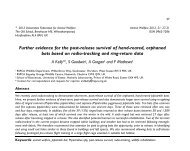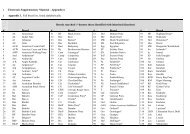2010-2011 Annual Report - Universities Federation for Animal Welfare
2010-2011 Annual Report - Universities Federation for Animal Welfare
2010-2011 Annual Report - Universities Federation for Animal Welfare
Create successful ePaper yourself
Turn your PDF publications into a flip-book with our unique Google optimized e-Paper software.
Education<br />
Farm Handbook: Management and <strong>Welfare</strong><br />
of Farm <strong>Animal</strong>s<br />
The fifth edition of the UFAW Farm Handbook ‘Management and<br />
<strong>Welfare</strong> of Farm <strong>Animal</strong>s’ has been published as part of the<br />
UFAW/Wiley-Blackwell <strong>Animal</strong> <strong>Welfare</strong> series.<br />
The aim of this book is to promote the humane treatment of farm<br />
animals within the practical business context of modern farming. It<br />
is largely aimed at large-scale production on commercial farms but<br />
also covers alternative farming methods and smaller-scale units<br />
such as hobby farms. The handbook has been edited by the<br />
acknowledged expert in the field, Professor John Webster, and has<br />
been written by an impressive array of farm animal welfare<br />
specialists. We are very grateful to John and his team <strong>for</strong> this<br />
excellent new edition of the handbook.<br />
This is essential reading <strong>for</strong> veterinary students and<br />
those involved in developing or improving<br />
standards of welfare <strong>for</strong> farm animals. UFAW<br />
members are entitled to purchase the book from<br />
the publishers at the a discount price of £32.75.<br />
Support <strong>for</strong> educational initiatives<br />
UFAW supported a number of educational<br />
initiatives during the year, including a symposium<br />
on applied exotics and wildlife medicine organised<br />
by the Cambridge University Veterinary Zoological<br />
Society (CUVZS).<br />
LASA/UFAW Joint meeting<br />
In June <strong>2011</strong> UFAW co-organised, with LASA, a meeting on<br />
refinement of procedures and husbandry relating to the use of<br />
animals in research, although other aspects of the 3Rs were also<br />
discussed.<br />
Over 50 veterinarians, scientists, technicians and representatives<br />
of the Home Office Inspectorate attended. Papers were given on<br />
the assessment of animal suffering and on ways of improving the<br />
welfare of a wide range of species in the research environment. The<br />
meeting was judged to be a very useful means of spreading best<br />
practice and updating professionals in this field. A full report has<br />
been published in the summer <strong>2011</strong> issue of LASA Forum, pages<br />
14-16. UFAW joins LASA in thanking GSK <strong>for</strong> providing<br />
the venue.<br />
At the Bio-Ken 7th<br />
International Snakebite<br />
Seminar, John Cooper<br />
demonstrates how to<br />
handle a house snake<br />
(far left). Close-up of a<br />
puff adder (left).<br />
Participants at the<br />
CUVZS Symposium’s<br />
practical workshops.<br />
Exotic animals are increasingly being kept as pets in the UK and<br />
the two-day symposium sought to help disseminate in<strong>for</strong>mation to<br />
veterinary professionals and students on the care and treatment of<br />
exotics, and included talks from experts in the field and practical,<br />
hands-on sessions.<br />
A further activity in the field of exotic animal welfare that received<br />
support from UFAW was the Bio-Ken 7th International Snakebite<br />
Seminar. UFAW provided funds <strong>for</strong> two speakers, John and<br />
Margaret Cooper, to present on the ethical, legal and veterinary<br />
considerations when keeping and handling reptiles.<br />
The UFAW website on genetic welfare problems<br />
in companion animals<br />
This new website (at http://www.ufaw.org.uk/geneticwelfareproblems.php),<br />
which provides in<strong>for</strong>mation <strong>for</strong> prospective pet<br />
owners and <strong>for</strong> breeders on the welfare effects of disease conditions<br />
due to selective breeding in companion animals, was launched in<br />
April <strong>2011</strong>. It has grown very rapidly since work started on it in<br />
earnest during the year. It already includes in<strong>for</strong>mation on genetic<br />
diseases of 42 breeds of dogs and 7 breeds of cats, and also of some<br />
rabbits and fish. In total over 100 descriptions (of one condition in<br />
one breed) are now included, equivalent to quite a sizeable book of<br />
about 200,000 words, and it is growing at a rate of about 3 new<br />
descriptions a week. We are grateful to David and Rosie Godfrey<br />
<strong>for</strong> collecting and compiling much of the material and to everyone<br />
else who has contributed to the project (contributors are<br />
acknowledged at the site).<br />
Feedback has been very positive. We hope to be able to continue<br />
to expand and improve this web resource and are seeking funds <strong>for</strong><br />
this purpose.<br />
Science in the Service of <strong>Animal</strong> <strong>Welfare</strong> 8




